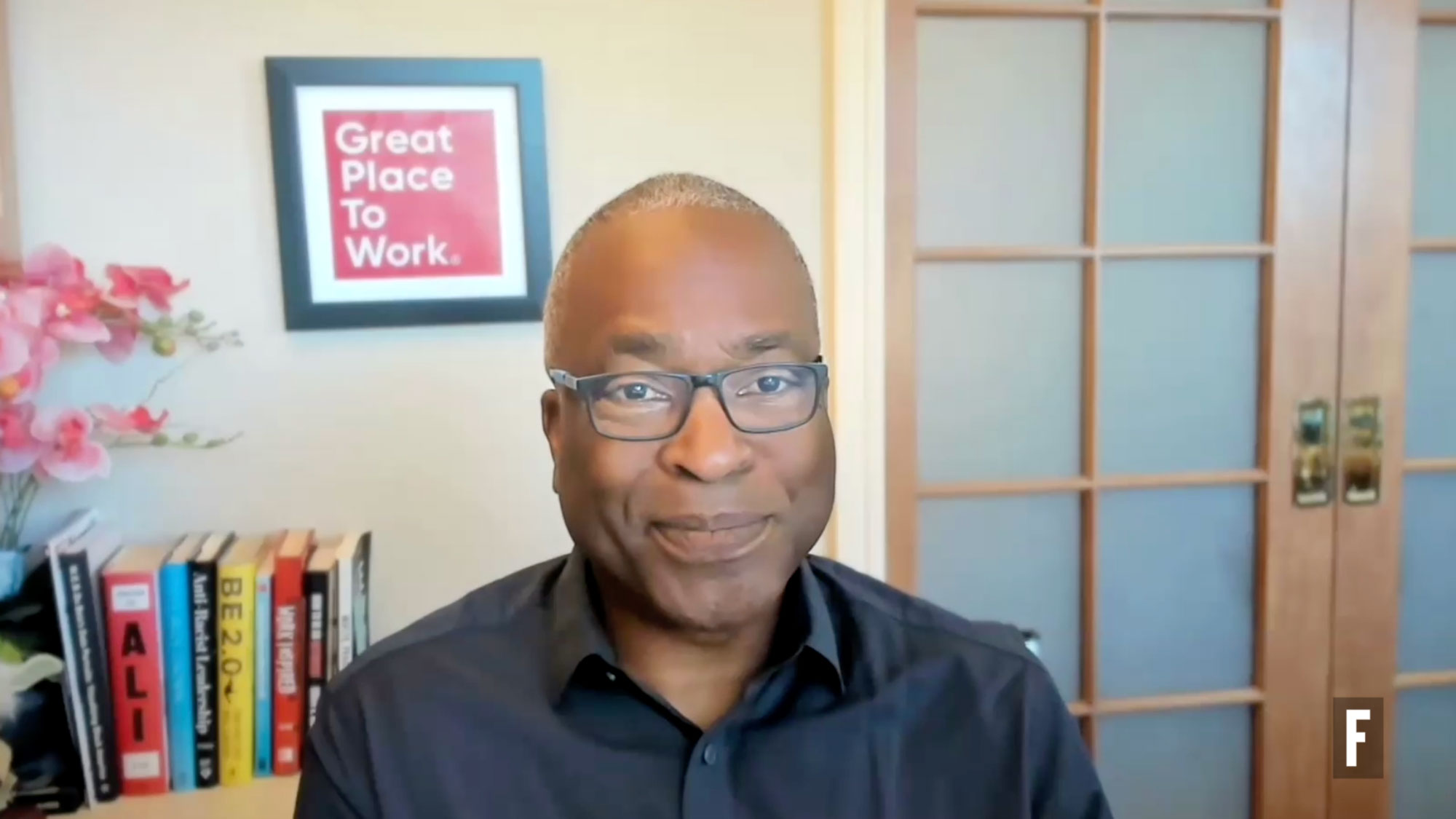Leaders from Hilton, Delta Air Lines, and Edward Jones joined Great Place To Work CEO Michael C. Bush in a panel discussion with Fortune’s Alan Murray.
What is the value of workplace culture?
Ask Chris Nassetta, president and CEO of Hilton, No. 1 on the Fortune 100 Best Companies to Work For® List in 2024, and he gives a simple answer: “Without trust, you don’t have the shield to get you through difficult times.” Nassetta shared this in a conversation moderated by outgoing Fortune CEO Alan Murray.
“COVID was a really good example,” he said. Because of the pandemic, Hilton had two-thirds of its workforce impacted by layoffs or furloughs. Three years later? Hilton is the No. 1 employer in America and No. 1 on the Fortune World’s Best Workplaces™ List.
Attend our annual company culture conference May 7-9, 2024
“How were we able to do it?” Nassetta asked, and then quickly answered: “Because we built an unbelievable culture.” In a crisis, the trust of employees offers unmatched resiliency for businesses.
“Trust helps mitigate fear,” Nassetta said.
Great workplaces are high-trust workplaces
Companies on the 100 Best list are workplaces with remarkably high levels of trust.
Great Place To Work® identifies the list by analyzing 1.3 million employee surveys annually to measure the worker experience, and how much trust those workers have in their leaders and colleagues.
“A great workplace is defined by trust,” said Michael C. Bush, CEO of Great Place To Work. Employees who trust their employer and enjoy who they work with are more likely to thrive in the workplace. And companies that create a high-trust culture see stronger business results.
In analysis from FTSE Russell, companies on the 100 Best list outperform the market by a factor of nearly four over a 25-year period.
Trust is a key focus for the CEOs that participated in Fortune’s virtual roundtable, including Penny Pennington, managing partner of Edward Jones and Ed Bastian, CEO of Delta Air Lines.
Trust and human connection are “the rails our business model runs on,” says Pennington. For a company that helps families with some of their most sensitive and personal decisions around their finances and future dreams, trust is a crucial ingredient for success. Bastion also notes the importance of trust with customers for his industry with 500,000 people entrusting their physical safety to Delta every day when they fly.
“We cannot possibly serve those customers as well as we can until we really know them." - Ed Bastian, CEO, Delta Air Lines
To build trust with customers, you have to start with employees.
“We trust our employees to make the right decisions,” said Bastian. “And as a result of that, that enables them to do an amazing job.”
Committed to diversity, equity, inclusion & belonging
If trust is a key differentiator for businesses, then diversity, equity, inclusion & belonging (DEIB) is a business imperative. Despite a national conversation that is divided on the topic, CEOs at the 100 Best are committed to the principles of diversity and belonging.
“This is about competitiveness,” Pennington said.
The customers Edward Jones serves — people building businesses, growing their families, and creating wealth — are an increasingly diverse group of people. These customers are looking for a company they can trust, Pennington said, and that means having advisors who are accessible and who understand them.
“We have to be a place of opportunity for more people,” Pennington said, “where a more diverse group of clients and professionals know that they belong.” To that end, over 50% of the new advisors Edward Jones hired in the last year were women and people of color.
The result? “Our reputation in our communities is going up,” Pennington shared.
“Without trust, you don’t have the shield to get you through difficult times." - Chris Nassetta, president and CEO, Hilton
Ignoring the backlash
For business leaders focused on results, the politics of DEIB aren’t worth consideration. For all the noise about DEIB in the headlines, the reality is that it’s the right thing to do when trying to run a successful business, Nassetta said.
At Delta Air Lines, flying all over the world and serving an incredibly diverse customer base of more than 200 million people, DEIB is a requirement for better customer service.
“We cannot possibly serve those customers as well as we can until we really know them,” Bastian said. “That’s the core driver of why we have to be a much more inclusive employer.”
To achieve this, Delta has focused on increasing its talent pool by removing college degree requirements for nearly all jobs in the company, including pilots.
“Honestly, I’d rather hire people with great skills,” Bastian said.
“We have to be a place of opportunity for more people, where a more diverse group of clients and professionals know that they belong." - Penny Pennington, managing partner, Edward Jones
What should leaders make of new reports that question the research behind diverse leadership teams leading to stronger business results? 100 Best leaders know DEIB has to be comprehensive to have the desired impact.
“It has to be embedded in the culture of the company,” Nassetta said. “People have to buy in at all levels that it is a business imperative.”
Just focusing on one aspect — such as representation in leadership — is not enough to drive growth.
What unlocks performance is when people can bring their full self to the table, says Pennington. Rather than just be a different voice in the room, can employees share the full breadth of their experience, perspectives, and ideas — not just how they look, but how they live and what they think the future should look like?
“When people know they can bring all of that to the table … that’s where the real innovation and growth happens,” Pennington said.
Get more insights
Hear from Chris Nassetta and other top leaders from the Fortune 100 Best Companies to Work For at our For All Summit™, May 7-9 in New Orleans.











